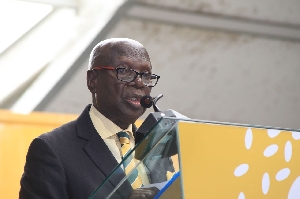Accra, Aug. 3, GNA - First ladies of Africa have committed themselves as champions of cervical cancer, which they described as "the most critical health issues of our time", and the growing burden of women's cancers in the poorest nations .
Making the commitment at the fourth annual Stop Cervical Cancer in Africa (SCCA) meeting in Accra , the First Ladies of Ghana, Niger, South Africa, Swaziland, Uganda, Zambia and The Gambia said: "As leaders, women, mothers and daughters, we realise that women's lives and health are in a critical transition period around the globe. "
A statement issued by the first ladies in Accra on Tuesday, after the August 27 meeting noted: " Increased global awareness and resources have contributed to promising improvements in women's health issues, including reducing infectious diseases and maternal mortality in developing countries.
"Though these challenges remain significant in places, increasingly, women in the developing world suffer from a new wave of non-communicable diseases, with women's cancers cutting lives short, weakening families, wrecking economic havoc and threatening the social fabric of communities.
"Today, 90 per cent of deaths from non-communicable diseases occur in the developing world. Cervical, breast and other women's cancers take a tremendous toll on women's health in developing countries."
It said more than 80 per cent of all cervical cancer deaths occur in developing countries where females do not have access to prevention services such as education and Human Pailloma Virus (HPV) vaccination and lifesaving pre cancer screening and early treatment.
"Breast cancer, once relatively unknown in developing countries, is rising rapidly, often appearing in women 10 to 15 years earlier than in developed countries.
" With no simple detection tools and tragically insufficient treatment options, breast cancer is quickly becoming the number one cancer killer of women in some developing countries.
" Today, cervical cancer and breast cancers kill more than half a million women in developing countries each year-greater than current estimates for maternal mortality globally."
The statement said the biggest tragedy is that these deaths are largely preventable and treatable when detected early.
"Our failure to act on what we know as preventable and treatable is causing premature loss of life of thousands of women throughout the developing world.
"We commit ourselves to work closely with our Heads of State, Ministries of Health, Foreign Affairs, UN missions and civil society leaders about the burden of women's cancers."
The three-day SCCA conference was on the theme: "Africa unite in action: Mobilising political and financial support to strengthen cervical cancer prevention through integration."
It was linked to the African First Ladies and Cervical Cancer project, launched in Cape Town July 20, 2009, during the 3rd Stop Cervical Cancer in Africa Conference.
It was organised by the government of Ghana in collaboration with Princess Nikky Breast Cancer Foundation.
It comprises 12 African First Ladies who are determined to reduce the burden of the disease by raising awareness through education.
The two major cancers in women in Ghana are cervical and breast cancer and are attributed to lack of awareness of the disease, a low level of screening and early detection.
Worldwide, 274,000 deaths occur annually due to cervical cancer with 80 per cent occurring in the developing countries.
Africa alone contributes 79,000 of the mortality rate and according to WHO studies, 18 per cent of cancer deaths in Ghana are through the disease.
Breast cancer killed 458,000 women worldwide in 2008 with 59 per cent of those deaths in less developed countries.
The cervical cancer forum is campaigning for access to medical resources to protect women in Africa from the fatal disease.
Those who attended the conference included personalities comprising the host First Lady, Mrs Naadu Mills; Mary Robinson; former president of Ireland, First Lady of South Africa and incoming Chairperson, Forum of Africa First Ladies Against Breast and Cervical Cancer, Madam Tobeka Madiba-Zuma and Mrs Janet Museveni, First lady of Uganda.
Ohers were Queen Nomsa LaMatsebula, First Lady of Swaziland; Mrs T. Salou, First Lady of Niger; Mrs Thandiwe Banda, First Lady of Zambia and Vice President of the National Assembly of Algeria; deputy speakers of parliament from Ghana, Uganda and Malawi; parliamentarians from across Africa; African Ministers' of Health.
The conference discussed topics like: Setting the scene- Burden of cervical cancer in Africa; The role of African First Ladies in cervical cancer prevention: the South African experience and cervical cancer diagnosis, treatment and palliation.
The key objectives of the forum were advocacy to increase awareness of cervical cancer in Africa; mobilisation of resources for the development of policy, strategies and actions to fight cervical cancer at the country, regional and international level; reduction of the stigmatisation of people suffering and living with cervical cancer in Africa and collaboration with global and local partners to confront and fight the disease together.
So far SCCA has increased visibility of cervical cancer in Africa through support from national and international stakeholders: Ministers of Health, advocates and survivors; lobbying of African presidents and governments, parliaments, religious institutions for cultural and policy change including the African Health Agenda and contributing the highest signatories to the Global Call to Stop Cervical Cancer with the First Lady of Uganda and Chairperson of the Forum.
Future activities of the Forum of African First Ladies is to attend key congresses including the Stop Cervical Cancer in Africa conference organised by the Princess Nikky Cancer Foundation; lobby Presidents, heads of state, governments and other First Ladies to include cancer on the World and African Health Agenda; mobilise the international community's existing and new resources for cancer in Africa; build on partnerships and collaborations with individuals and organisations in Africa, and around the world. To date, small-scale demonstration projects have been conducted in Africa to assess the feasibility of implementing screening and vaccination programmes.
Cervical cancer is the second most common cancer in women worldwide under the age of 45 years. The main cause of the disease is HPV and every woman may be at risk of contracting HPV.
HPV is easily transmitted through genital skin contact
Health News of Tuesday, 3 August 2010
Source: GNA
















